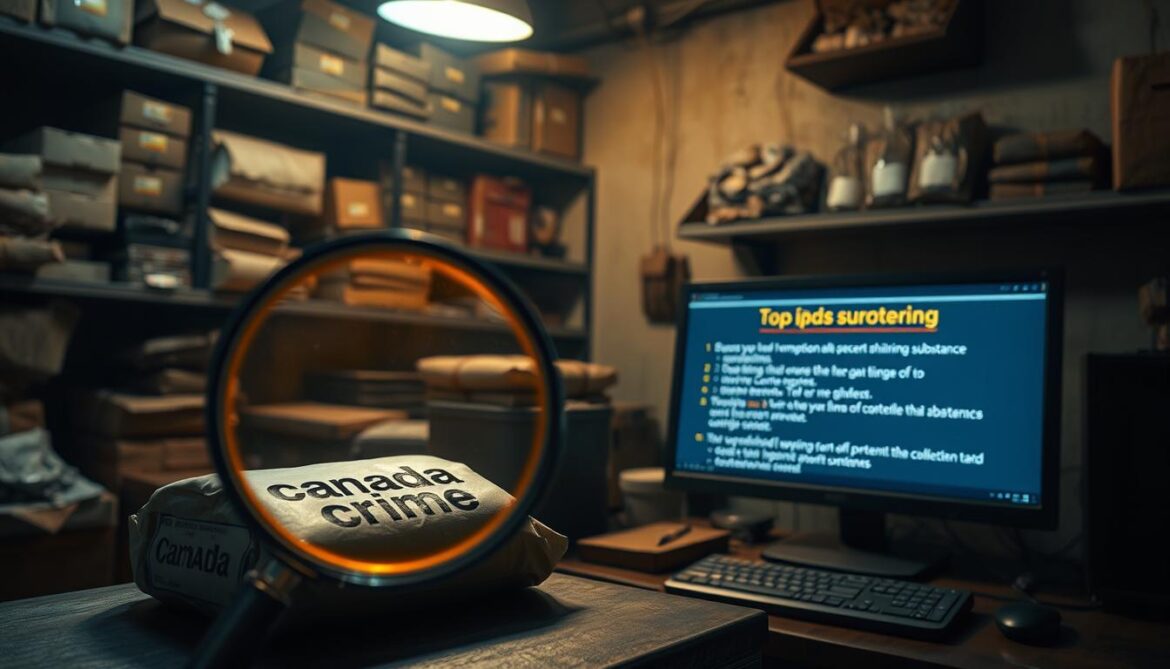Did you know almost $28 billion in drugs cross borders worldwide each year? A big chunk of this ends up in Canada. It’s vital for Canadians traveling or doing business to understand how to prevent drug trafficking. They must also follow the rules for controlled substances carefully.
This guide gives you key tips to stop controlled substance importation. By knowing and following Canadian laws, you protect yourself from big legal troubles. You also help keep the public safe and healthy. With this info, you can deal with cross-border substance rules confidently.
Understanding Controlled Substances and Their Regulations
Understanding controlled substances is key for keeping up with regulatory compliance controlled substances. These substances include drugs like cannabis, fentanyl, and cocaine. They are tightly controlled because they can be abused and lead to addiction.
Definition of Controlled Substances
Controlled substances are ranked by their risk and medical value. They can be prescription meds or illegal drugs. Examples are opioids such as fentanyl, stimulants like cocaine, and depressants including cannabis. This system helps make sure these substances are used safely and only when necessary.
Regulatory Framework in Canada
Canada’s drug laws aim to keep the public safe. They include rules for making, sharing, and using these substances. Following these rules means closely watching activities and having tough consequences for breaking them.
Key Legislation: Controlled Drugs and Substances Act (CDSA)
The main law for Canada’s drug rules is the Controlled Drugs and Substances Act (CDSA). It controls how controlled substances are handled, banning things like selling and making them unless allowed by law. The CDSA is crucial for keeping controlled substances in check. It helps stop their wrong use and illegal sharing.
Importance of Preventing Controlled Substance Importation
Stopping drugs from being smuggled into the country is key for both health and money reasons. By focusing on blocking drug smuggling, we can lessen the bad health outcomes and financial issues it causes.
Public Health and Safety Concerns
Blocking drugs from entering helps keep people safe. Illegal drugs can cause overdoses, health problems, and death. It also means our health services can focus on other important areas without the extra strain.
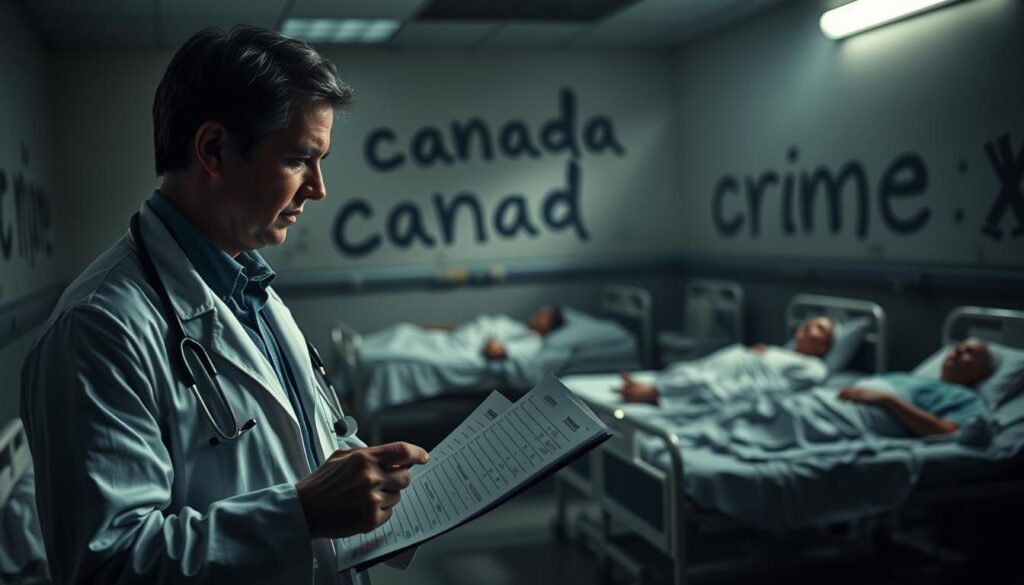
Economic Impact
Drug smuggling hits the economy hard. Fighting this issue cuts costs in law enforcement, courts, and jails. It also reduces the need for emergency health services to deal with drug issues. Taking steps to prevent drug smuggling makes for a stronger, better economy.
Tips to Prevent Importation of Controlled Substances
To stop the importation of controlled substances, it’s crucial to follow best practices. Proper documentation and regular training can keep organizations in line with laws. This helps to stop illegal activities.
Proper Documentation and Record Keeping
Keeping detailed documentation for controlled substances is key for following the rules and tracking. You should have records of all dealings, where things are kept, and how they’re moved. This makes sure there is a trail for officials to check if needed.
Using a digital system for keeping records helps avoid mistakes and makes things run smoother. It’s easier to keep an eye on stock and spot any issues quickly. Doing regular checks on your documentation ensures everything is up to standard.
Regular Training and Awareness Programs
Offering training for smuggling prevention is crucial to stop illegal drug imports. Staff should learn about the latest rules and ways smuggling is done. This helps them spot anything odd.
Creating a detailed training plan that includes real-life examples, practice scenarios, and updates on laws works well. Running awareness events in the company also helps highlight the need to follow rules. This builds a culture of staying alert.
Using these tips to prevent importation of controlled substances makes your organization safer and in line with the law. Having the right paperwork and ongoing education are more than just rules. They are key in fighting against illegal drug trade.
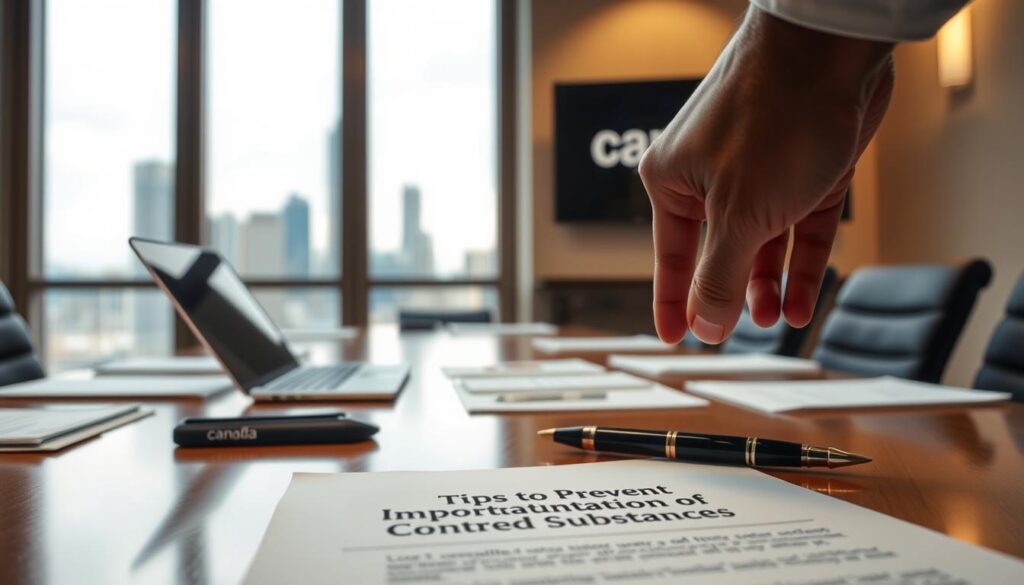
How to Comply with Customs Regulations
Following customs rules for controlled substances is important for legal importation of drugs into Canada. This applies to healthcare providers, pharmacists, or importers. Knowing the correct steps and required permits is key.
Declaring Controlled Substances at the Border
When you reach Canadian borders, you must declare any controlled substances you carry. Not reporting these substances correctly can lead to delays, fines, or legal issues. Border protocols help stop illegal transport and keep the public safe.
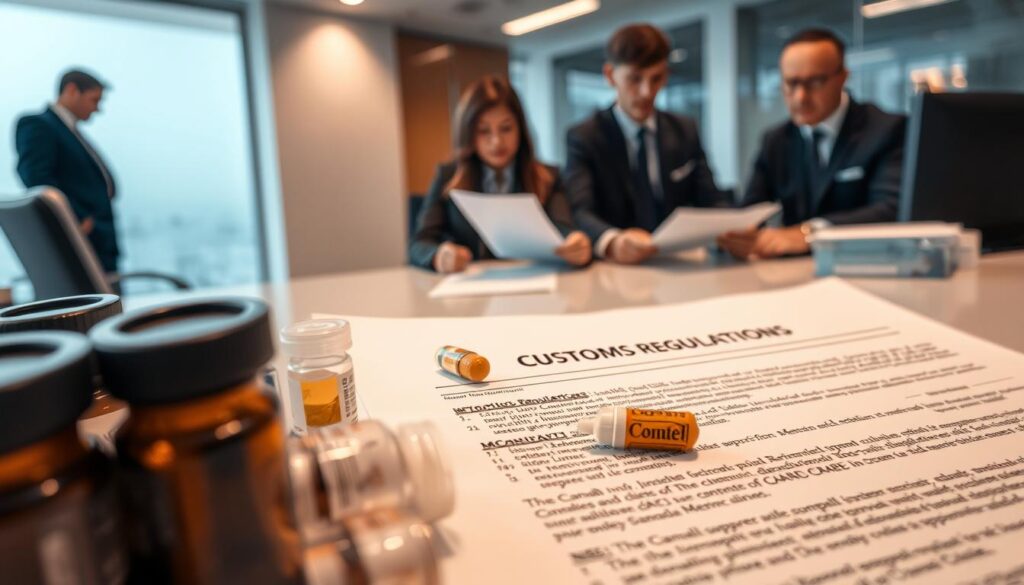
For an easier declaration process, have your Health Canada permits and prescriptions ready. You can also arrange for faster clearance beforehand to reduce border hassle.
Understanding Exemptions and Permits
Not every controlled substance is treated the same. Knowing which exemptions and permits your drug imports need helps with legal compliance. Health Canada has exemptions and permits for certain controlled drugs.
The following table outlines key exemptions and required permits:
| Substance Category | Exemption Type | Required Permits |
|---|---|---|
| Prescription Drugs | Personal Use | Valid Prescription |
| Research Chemicals | Scientific Research | Research Permit |
| Pharmaceutical Imports | Commercial Use | Import License |
Understanding these rules helps you comply and make drug importation smoother.
Best Practices for Border Security
Keeping our borders safe is vital to stop illegal drugs from entering. We need advanced border management strategies to make this happen. Modern tech and teamwork are key to making our borders secure.
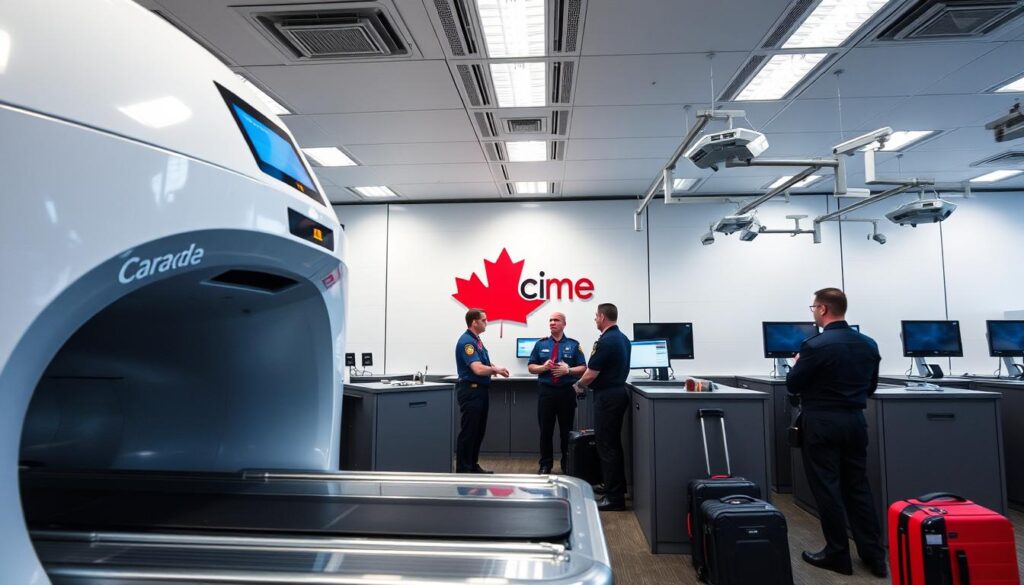
Use of Advanced Screening Technologies
Using advanced screening technologies helps find and stop illegal drugs. Tools like X-ray machines, trace detectors, and AI help spot suspicious items quickly. Putting these technologies at border points helps catch more illegal substances and make inspections better.
Effective Communication and Collaboration
Good border security needs effective communication and collaboration between different agencies. Working together in real-time helps share important information fast. This helps act quickly against threats. Training together and sharing info are key, so everyone is ready to fight drug trafficking.
| Best Practice | Description |
|---|---|
| Advanced Screening Technologies | Utilize high-tech screening tools like X-rays, trace detectors, and AI systems to detect drugs. |
| Effective Communication | Foster collaboration between agencies to share intelligence and coordinate responses efficiently. |
| Joint Training Exercises | Engage in regular training to ensure all agencies are equipped to manage border security challenges. |
To wrap up, using top-notch technologies and working together are the main parts of strong border security plans. By following these best practices, we can greatly lower the risks of illegal drugs coming into our country.
Strategies for Law Enforcement
Law enforcement needs strong strategies to fight the issues caused by illegal drugs. Working together internationally and using up-to-date watching methods are important. They help decrease the use of these substances.
Cooperation with International Agencies
Working with agencies from different countries makes fighting drug trafficking better. These agencies share information, help, and successful strategies. This united effort makes a big difference.
Joining forces with groups like INTERPOL and Europol expands the network fighting drugs. This teamwork boosts the ability to operate and brings everyone together against worldwide dangers.
Proactive Monitoring and Surveillance
It’s crucial to use good surveillance to spot and stop illegal drug activities. Using drones, satellite pictures, and deep data checks is key. These methods offer quick information, letting drug enforcement teams react fast.
Adding AI tools and predicting risks beforehand improves how well we can prevent dangers. By using these advanced steps, officers can be one step ahead of criminals. This means better protection for our neighborhoods.
Dealing with Suspicious Activities
It’s very important to deal with suspicious activities to keep things safe. Being alert to drug smuggling stops illegal drugs from coming in. Reporting any unusual actions helps the police stay ahead.
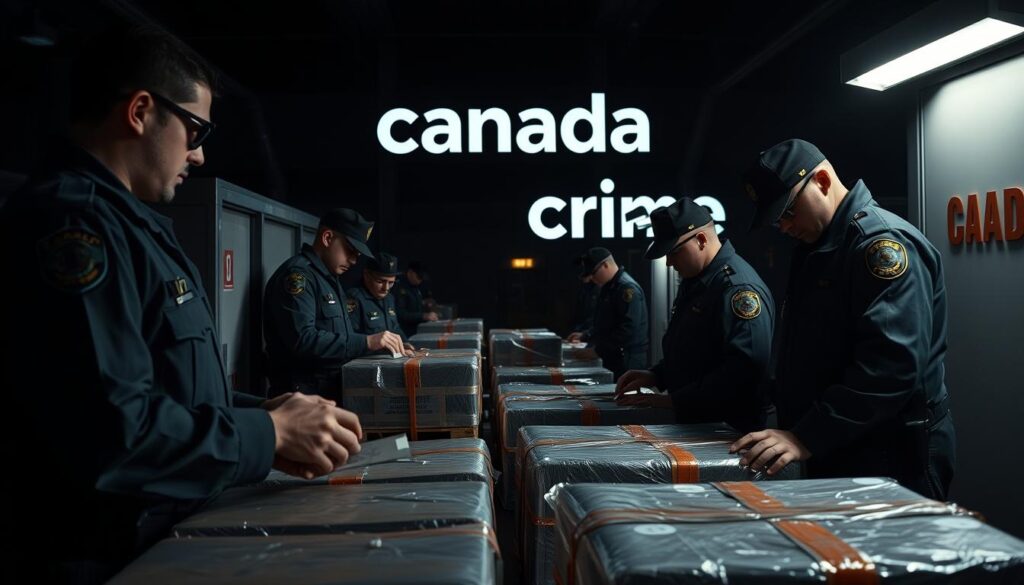
Being aware and reacting quickly can stop threats. Having good security rules means weird things get noticed fast. Acting fast when we see drug smuggling keeps everyone safe and our country secure.
Teaching people how to notice and report strange actions makes us all more alert. Telling the authorities about odd behavior can really lower the risk of illegal drugs getting in and harming people.
| Strategies | Benefits |
|---|---|
| Vigilant Observation | Enhances early detection of unlawful activities. |
| Timely Reporting | Allows quicker response from law enforcement. |
| Regular Training | Keeps personnel updated on latest security protocols. |
Teaching the community the importance of noticing strange behavior makes us all safer. Always updating and following strict security rules is key to stop drug trafficking.
Risks of Drug Trafficking and Smuggling
Drug trafficking and smuggling bring big risks to both people and places. These dangers go beyond breaking the law. They deeply impact health and safety too.

Potential Legal Penalties
The legal consequences of smuggling are harsh and widespread. People involved can end up in jail for a long time, pay huge fines, and get a criminal record that lasts forever. The Controlled Drugs and Substances Act (CDSA) sets strict penalties for drug trafficking, showing how strongly law enforcement fights these crimes.
Health Risks Associated with Illicit Drugs
The health risks of illicit drugs are huge. Using these drugs can cause serious mental and physical issues. These include addiction, overdose, and harm to the brain over time. Moreover, drug misuse is linked to the spread of deadly diseases like HIV/AIDS and hepatitis, hurting public health systems.
Knowing the risks of drug trafficking and the health dangers is key. It helps in educating people and pushing for actions to keep communities safe.
Implementing Organizational Policies
To make sure an organization follows the law on controlled substances, strong policies are needed. They must do regular checks and quickly look into any problems. By doing this, they greatly cut down on the risks of illegal drug activities.
Routine Controlled Substance Checks
Doing regular checks is key to keeping things in line with the rules. These checks find problems early and make sure drug policies at work are respected. By auditing regularly, it not only keeps an eye on things but also stops wrongful use or theft of drugs.
Investigating and Documenting Discrepancies
If there are any problems found, they must be looked into right away and with care. There need to be clear steps on how to record these investigations. This ensures everything is above board, making reviews and inspections easier to handle.
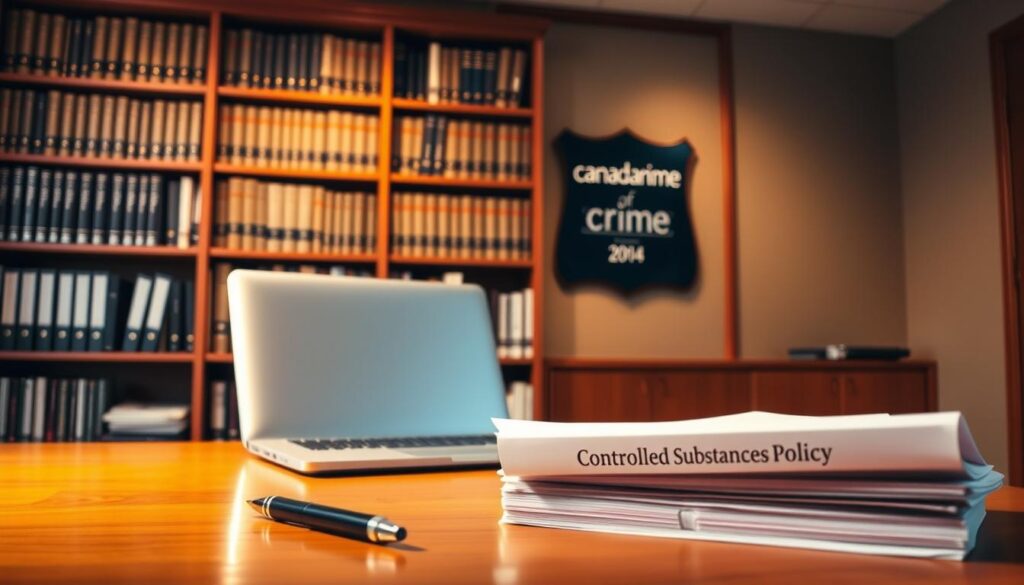
Role of Healthcare Providers in Preventing Controlled Substance Importation
Healthcare providers are key in stopping the import and misuse of controlled substances. They do more than care for patients. They ensure drugs are prescribed and used correctly. This is vital to make sure medicines help and don’t get misused or sold illegally.
Proper Prescribing Practices
Healthcare providers must prescribe drugs correctly. This means diagnosing correctly, choosing the right medicine, and explaining how to use it. With the focus on preventing illegal drug sales, it’s important that all prescriptions are given for the right reasons.
Monitoring Patient Usage
Keeping an eye on how patients use drugs is crucial to spot and stop abuse or illegal use. Providers need to track prescriptions and check in with patients to make sure they’re using medication right. This helps find any signs that someone might be misusing drugs, which helps prevent illegal drug sales.

| Responsibility | Description |
|---|---|
| Proper Prescribing Practices | Ensure accurate diagnosis, correct medication, and clear instructions to prevent misuse. |
| Monitoring Patient Usage | Keep detailed records and follow up with patients to ensure appropriate medication use. |
The Impact of Regulatory Compliance
Following regulations is key for public health and keeping controlled substances safe. Regulatory compliance benefits go beyond stopping illegal acts. They ensure consistent standards for all legal parties dealing with these substances.
Rules like the Controlled Drugs and Substances Act (CDSA) greatly affect public safety. They require strict following of rules. This makes sure companies handle controlled substances with care, cutting down the risk of them being wrongly used or diverted. This active effort stops illegal imports and keeps Canadians healthy and safe.

The impacts of controlling substances are wide-ranging. They help prevent abuse and stop controlled substances from getting into the wrong hands. The rules set by Health Canada involve tough inspections and following rules closely. This makes these regulations more effective.
Working together with different groups both in Canada and around the world also helps. This teamwork between governments, healthcare providers, and businesses strengthens how well the regulations work. It helps stop misuse and controlled substances from being diverted.
The main benefits of sticking to regulations for controlled substances include:
| Factor | Benefit |
|---|---|
| Public Health and Safety | Reduces risk of misuse and diversion |
| Legal Framework | Standardizes control measures |
| Risk Reduction | Minimizes illegal distribution channels |
| Stakeholder Collaboration | Enhances compliance and monitoring efforts |
| International Cooperation | Promotes global standards and enforcement |
Knowing the benefits of regulatory compliance clearly shows its importance in protecting society.
Conclusion
Stopping the flow of illegal drugs into Canada needs teamwork. It includes people from law enforcement to doctors and nurses. We’ve looked at ways to keep drugs out, focusing on the rules in the Controlled Drugs and Substances Act (CDSA).
To keep our community safe and economy strong, we must check documents and train often. Using new tech to screen goods helps too. Working together and watching carefully make it hard for illegal drugs to enter our country.
It’s very important to follow the rules at the border and for businesses to have strict policies. Doctors must also be careful when giving out medicine. By working together, we protect our communities and keep Canada’s borders safe from illegal drugs.

